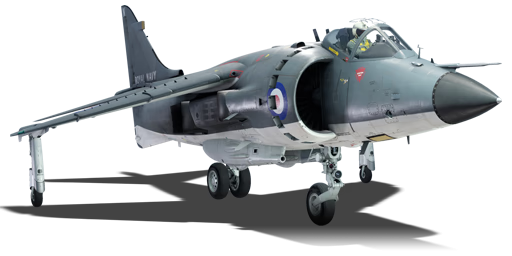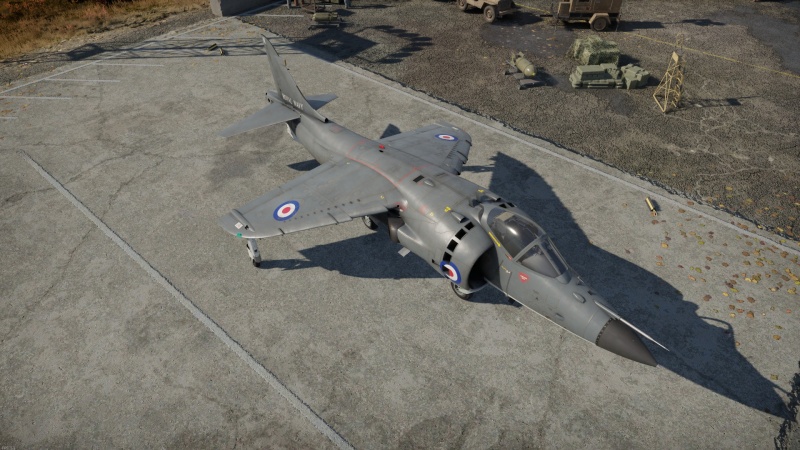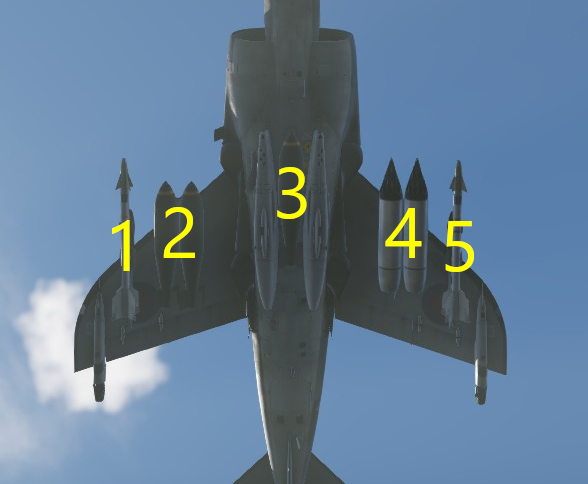Sea Harrier FRS.1 (e)
| This page is about the British strike aircraft Sea Harrier FRS.1 (e). For the squadron version, see Sea Harrier FRS.1. For other versions, see Harrier (Family). |
Contents
Description
The British Aerospace Sea Harrier was VTOL fighter bomber that was designed by Britain based in the successful Harrier GR.3. It entered service with the Royal Navy in April 1980 as the Sea Harrier FRS.1. This aircraft was equipped with a single Rolls Royce Pegasus turbofan engine, as well as a Ferranti Blue Fox radar. The early service variant of the FRS.1 included a bubble canopy that would characterize later variants of the Sea Harrier, it also featured AIM-9L AAM for self defence, later variants of the Sea Harrier introduced modifications to the pylons, to be able to carry more AIM-9L sidewinders, as well as Sea Eagle anti-ship missiles after the Falklands War.
It was introduced in Update "Sons of Attila". The Sea Harrier FRS.1 Early is not very different from many other Harriers in game in terms of gameplay. It has a very good speed acceleration, meaning that it is one of the first to take off from the runway, while also having access to a decent radar and 2 x AIM-9L Sidewinders. Like all Harriers, it features VTOL, however it can't do that while carrying a heavy payload, like bombs. It lacks any sort of guided ordinance for ground battles, but its 5 x 1000lb bombs are enough to destroy a base in air battles, or a couple of ground targets if used properly, however for this task more specialized attackers like the Jaguar are more recommended
General info
Flight performance
The Sea Harrier has a very similar performance to other Harriers in game. It has an excellent low speed acceleration, and good agility at high speeds, at the cost of energy retention, which is very poor. This aircraft is also capable of vertical landings and take-off without heavy payloads.
| Characteristics | Max speed (km/h at 0 m) |
Max altitude (metres) |
Turn time (seconds) |
Rate of climb (metres/second) |
Take-off run (metres) | |||
|---|---|---|---|---|---|---|---|---|
| AB | RB | AB | RB | AB | RB | |||
| Stock | 1150 | 1144 | 12192 | 32.5 | 34.0 | 70.2 | 68.5 | 550 |
| Upgraded | 1168 | 1159 | 31.5 | 32.0 | 105.2 | 87.0 | ||
Details
| Features | |||||
|---|---|---|---|---|---|
| Combat flaps | Take-off flaps | Landing flaps | Air brakes | Arrestor gear | Drogue chute |
| X | ✓ | ✓ | ✓ | X | X |
| Limits | ||||||
|---|---|---|---|---|---|---|
| Wings (km/h) | Gear (km/h) | Flaps (km/h) | Max Static G | |||
| Combat | Take-off | Landing | + | - | ||
| 1191 | 648 | N/A | 829 | 556 | ~14 | ~6 |
| Optimal velocities (km/h) | |||
|---|---|---|---|
| Ailerons | Rudder | Elevators | Radiator |
| < 650 | < 950 | < 790 | N/A |
Engine performance
| Engine | Aircraft mass | |||||
|---|---|---|---|---|---|---|
| Engine name | Number | Basic mass | Wing loading (full fuel) | |||
| Rolls-Royce Pegasus Mk.104 | 1 | 6,258 kg | 462 kg/m2 | |||
| Engine characteristics | Mass with fuel (no weapons load) | Max Gross Weight | ||||
| Weight (each) | Type | 9 m fuel | 20 m fuel | 30 m fuel | ||
| 1650 kg | Vectored-thrust low-bypass turbofan | 6,959 kg | 7,661 kg | 8,363 kg | 11,409 kg | |
| Maximum engine thrust @ 0 m (RB/SB) | Thrust to weight ratio @ 0 m (___%/WEP) | |||||
| Condition | 100% | WEP | _m fuel | __m fuel | __m fuel | MGW |
| Stationary | 9,150 kgf | 9,709 kgf | 1.40 | 1.27 | 1.16 | 0.85 |
| Optimal | 9,150 kgf (0 km/h) |
9,709 kgf (0 km/h) |
1.40 | 1.27 | 1.16 | 0.85 |
Survivability and armour
The Sea Harrier lacks any sort of armour, and it has a mediocre survivability, since the engine is pretty large and vulnerable because it is located at the centre of the aircraft. However it does feature 60 x countermeasures for defence against radar and IR guided missiles.
Modifications and economy
Armaments
| Ballistic Computer | |||
|---|---|---|---|
| CCIP (Guns) | CCIP (Rockets) | CCIP (Bombs) | CCRP (Bombs) |
| |
|
|
|
Offensive armament
The Sea Harrier FRS.1 (e) is armed with:
- 2 x 30 mm ADEN Mk.4 cannons, belly-mounted (130 rpg = 260 total)
- 60 x countermeasures
Suspended armament
The Sea Harrier FRS.1 (e) can be outfitted with the following ordnance:
| 1 | 2 | 3 | 4 | 5 | ||
|---|---|---|---|---|---|---|
| 1,000 lb H.E. M.C. Mk.13 bombs | 1, 2 | 1 | 1, 2 | |||
| 1,000 lb H.E. M.C. Mk.13 No.117 bombs | 1, 2 | 1 | 1, 2 | |||
| RP rockets | 36 | 36 | ||||
| AIM-9G Sidewinder missiles | 1 | 1 | ||||
| AIM-9L Sidewinder missiles | 1 | 1 |
| Default weapon presets | |
|---|---|
| |
Usage in battles
Fighter Role:
The Sea Harrier sits at BR where supersonic fighters start to become very common, however the Sea Harrier does have access to a set of powerful missiles, the early AIM-9G Sidewinders are good but they lack all aspect seekers, the AIM-9L fixes this issue, while also having much better manoeuvrability, if the Sea Harrier wants to be played as a fighter, a good idea is climbing at high altitudes in downtiers, to then launch your IR missiles at enemies within range, since both the AIM-9G and AIM-9L have good range for a small IR missile, they can be launched at enemies within 3-4 KM of range, even more if the enemies are at a low energy state. In uptiers fighting close to the ground is more recommended, since radar missiles start to become deadlier and more common, however the idea stays the same, launching missiles at enemies without flares or at a low energy state from the distance. The Harrier has a good performance at high speeds but becomes more sluggish below 800KM/h, so it is highly recommended staying at those speeds.
Bomber/Strike Aircraft Role:
As a strike aircraft, the Sea Harrier can be used with some success, in downtiers or slight uptiers, it can be used to destroy a single base when carrying a custom loadout of 5 x 1000lb bombs, you can also carry 2 x AIM-9Ls alongside your bombs. When doing this, flying close to your team is very recommended, since the Harrier's already lacklustre flight performance is hampered by the addition of heavy payload, the Sea Harrier also loses the ability to take off vertically with a heavy loadout. Your good low speed acceleration means that even with the bombs attached to your aircraft, you will be one of the firsts to take off from the runway, however your team will quickly catch up, doing bomb runs in uptiers is not recommended, since much faster attack aircrafts will outrun you and destroy most valuable bases and ground targets before you do. In ground battles the Sea Harrier is not recommended taking, since it lacks access to guided ordinance or rockets with a HEAT warhead, the RP rockets use a HE warhead, that is extremely underpowered even against lightly armoured targets.
Pros and cons
Pros:
- Very good low speed acceleration
- Access to vertical landing/take-off
- Good agility at high speeds
- Access to 2 x AIM-9L all aspect missiles
- Access to a radar, unlike most Harriers
Cons:
- Can't use VTOL mode with heavy payload
- Lacks any sort of guided ordinance against ground targets
- Poor agility below 800KM/h
- Limited WEP
- Relatively underpowered radar when compared to more advanced fighters around its BR
History
Describe the history of the creation and combat usage of the aircraft in more detail than in the introduction. If the historical reference turns out to be too long, take it to a separate article, taking a link to the article about the vehicle and adding a block "/History" (example: https://wiki.warthunder.com/(Vehicle-name)/History) and add a link to it here using the main template. Be sure to reference text and sources by using <ref></ref>, as well as adding them at the end of the article with <references />. This section may also include the vehicle's dev blog entry (if applicable) and the in-game encyclopedia description (under === In-game description ===, also if applicable).
Media
- Skins
See also
Links to the articles on the War Thunder Wiki that you think will be useful for the reader, for example:
- reference to the series of the aircraft;
- links to approximate analogues of other nations and research trees.
External links
Paste links to sources and external resources, such as:
- topic on the official game forum;
- other literature.
| British Aerospace plc | |
|---|---|
| Strike Aircraft | Harrier GR.7 · Sea Harrier FRS.1 (e) · Sea Harrier FRS.1 · Sea Harrier FA 2 |
| See also | British Aircraft Corporation · Hawker Aircraft Limited |
| Britain jet aircraft | |
|---|---|
| Blackburn | Buccaneer S.1 · Buccaneer S.2 · Buccaneer S.2B |
| British Aerospace | Harrier GR.7 · Sea Harrier FRS.1 (e) · Sea Harrier FRS.1 · Sea Harrier FA 2 |
| British Aircraft Corporation | Strikemaster Mk.88 |
| English Electric | Canberra B Mk 2 · Canberra B (I) Mk 6 · Lightning F.6 · Lightning F.53 |
| Gloster | Meteor F Mk 3 · Sea Meteor F Mk 3 · Meteor F Mk 4 G.41F · Meteor F Mk 4 G.41G · Meteor F Mk 8 G.41K · Meteor F Mk.8 Reaper |
| Javelin F.(A.W.) Mk.9 | |
| de Havilland | Vampire F.B.5 · Venom FB.4 · Sea Venom FAW 20 · Sea Vixen F.A.W. Mk.2 |
| Hawker | Sea Hawk FGA.6 · Hunter F.1 · Hunter F.6 · Hunter FGA.9 · Harrier GR.1 · Harrier GR.3 |
| Panavia | Tornado GR.1 · Tornado GR.4 · Tornado F.3 · Tornado F.3 Late |
| SEPECAT | Jaguar GR.1 · Jaguar GR.1A · Jaguar IS |
| Supermarine | Attacker FB 1 · Attacker FB.2 · Scimitar F Mk.1 · Swift F.1 · Swift F.7 |
| Foreign | Phantom FG.1 (USA) · Phantom FGR.2 (USA) · F-4J(UK) Phantom II (USA) |
| Australia | F-111C |
| India | ▄MiG-21 Bison |
| South Africa | ▄JAS39C |






